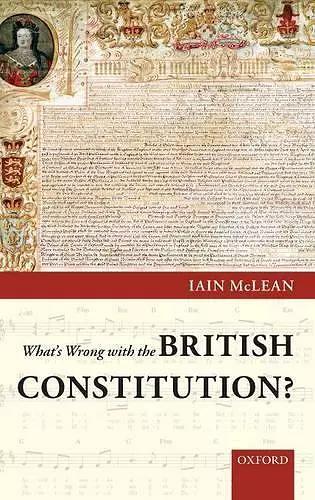What's Wrong with the British Constitution?
Format:Hardback
Publisher:Oxford University Press
Published:12th Nov '09
Currently unavailable, and unfortunately no date known when it will be back
This hardback is available in another edition too:
- Paperback£53.00(9780199656455)

Winner: W. J. M. Mackenzie Book Prize
A bravura critique of the traditional interpretation of the British constitution. The book demolishes many of the myths surrounding it, but also goes on to suggest a constructive alternative.In this provocative new study, Iain McLean argues that the traditional story of the British constitution does not make sense. It purports to be both positive and normative: that is, to describe both how people actually behave and how they ought to behave. In fact, it fails to do either; it is not a correct description and it has no persuasive force. The book goes on to offer a reasoned alternative. The position that still dominates the field of constitutional law is that of parliamentary sovereignty (or supremacy). According to this view, the supreme lawgiver in the United Kingdom is Parliament. Some writers in this tradition go on to insist that Parliament in turn derives its authority from the people, because the people elect Parliament. An obvious problem with this view is that Parliament, to a lawyer, comprises three houses: monarch, Lords, and Commons. The people elect only one of those three houses. This book aims to show, contrary to the prevailing view, that the UK exists by virtue of a constitutional contract between two previously independent states. Professor McLean argues that the work of the influential constitutional theorist A.V. Dicey has little to offer those who really want to understand the nature of the constitution. Instead, greater understanding can be gleaned from considering the 'veto plays' and 'credible threats' available to politicians since 1707. He suggests that the idea that the people are sovereign dates back to the 17th century (maybe the 14th in Scotland), but has gone underground in English constitutional writing. He goes on to show that devolution and the UK's relationship with the rest of Europe have taken the UK along a constitutionalist road since 1972, and perhaps since 1920. He concludes that no intellectually defensible case can be made for retaining an unelected house of Parliament, an unelected head of state, or an established church. The book will be essential reading for political scientists, constitutional lawyers, historians, and politicians alike.
Over the last two decades political scientists have broadened their interest to include the constitution, and the result has been a number of informative books on the subject Ian McLean's new contribution is one of the, if not the, best of the lot. It combines enlightening history, careful empirical analysis, and provocative prescriptions this wise and thoughtful book that deserves careful attention from students of both British politics and comparative constitutions. * The British Politics Group newsletter, APSA *
McLean's iconoclastic enterprise requires precision, and the book delivers. His intelligent application of rational choice theory provides useful insights into taken-for-granted history. Not everyone will agree with his prescriptions, but everyone interested in Britain's constitution political scientists, historians or lawyers should buy this book. It is a splendid and original addition to the literature. * Nicholas Allen, Political Studies Review *
This path-breaking book rediscovers forgotten themes that unite Britain and America into a common constitutional tradition. McLean's account of the British Constitution will provoke a broad-ranging, and international, debate. * Bruce Ackerman, Sterling Professor of Law and Political Science, Yale University *
Iain McLean is a fascinating guide to the British Constitution, fundamental aspects of which have been largely invisible within a narrowly anglocentric tradition of constitutional analysis and interpretation. Public lawyers, in particular, have much to learn from McLean. * Colin Kidd, Professor of Modern History, University of Glasgow *
The received doctrine, which goes back to the late 19th-century legal theorist A.V. Dicey, is that there is no limit to what the Queen in Parliament can do: make wars, abrogate individual rights, suspend habeas corpus, and so on. Iain McLean, the Oxford professor of politics, has written a new book, Whats Wrong with the British Constitution?, arguing that this is obsolete, if it was ever trueA viable constitution should contain rules for its own amendment, as the US constitution doesNo written document can prevent misconduct, but it can raise barriers to make such misconduct more difficult. * Samuel Brittan, Financial Times, April 2010 *
...public lawyers willing to embrace other disciplines will enjoy this book, which is a radical political scientist's critique of the British Constitution...It is a radical spirit that he writes, and with equal sharpness and verve: a treat for those who are willing to be provoked as well as educated and informed * Professor Robert Hazell, Public Law *
- Winner of Winner of the 2010 W.J.M. Mackenzie Book Prize.
ISBN: 9780199546954
Dimensions: 241mm x 163mm x 28mm
Weight: 748g
400 pages